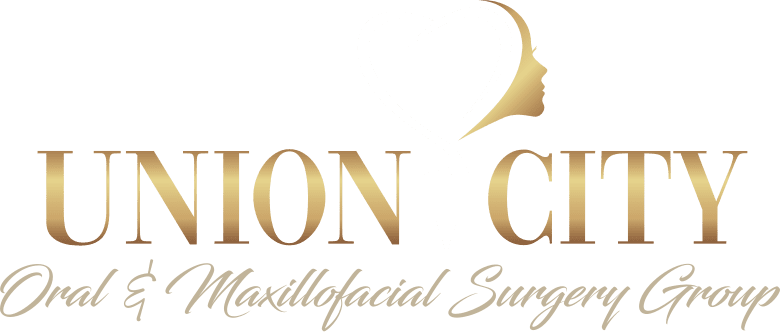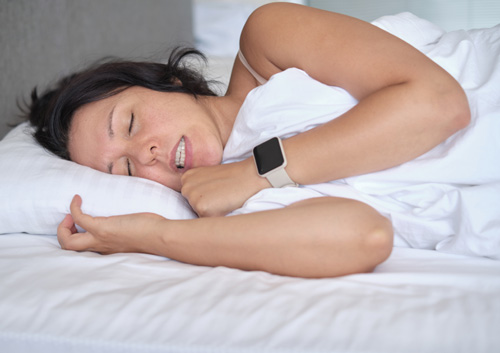Bruxism, commonly known as teeth grinding, is a condition that affects many individuals, often during sleep. While it may seem like a dental issue alone, bruxism has significant links to sleep disorders. People who grind their teeth at night may not realize the root cause often lies in disruptions within their sleep patterns. Understanding the connection between bruxism and sleep disorders can help in diagnosing and treating this condition more effectively.
At Union City Oral Surgery Group, we frequently see patients who struggle with bruxism, sometimes without realizing it. Teeth grinding can lead to serious oral health issues if left untreated, such as enamel erosion, jaw pain, and even tooth loss. We are dedicated to helping patients identify the underlying causes of bruxism, especially when it is linked to sleep disorders. With a thorough diagnosis and targeted treatment plan, you can manage your bruxism and protect your oral health.
What Causes Bruxism?
Bruxism can stem from a variety of factors. One of the most significant is stress or anxiety, which can cause people to clench their jaws and grind their teeth, especially at night. However, recent research has shown that sleep disorders, such as sleep apnea, may also be major contributors. In sleep apnea, for example, the airway becomes blocked during sleep, leading to poor oxygen flow and multiple interruptions in breathing throughout the night. These interruptions may cause the body to react by clenching the jaw or grinding teeth as a response to airway obstruction.
Another potential cause of bruxism related to sleep is the body’s stress response. When a person’s sleep is disrupted, the body can enter a heightened state of alertness, leading to involuntary muscle movements, including jaw clenching. Sleep disorders such as insomnia, where a person has trouble falling or staying asleep, may also cause similar issues. These constant disruptions to restful sleep often lead to fatigue, which can exacerbate the tendency to grind teeth.
Medications and lifestyle choices can further contribute to bruxism. Certain antidepressants or stimulants may cause or worsen teeth grinding. Additionally, behaviors like consuming alcohol, smoking, or drinking caffeine before bed can intensify bruxism, particularly in individuals who already suffer from sleep disorders.
How Sleep Disorders Affect Bruxism
Sleep disorders are closely linked to bruxism in various ways. Sleep apnea, a condition characterized by interrupted breathing during sleep, is one of the most common disorders associated with nighttime teeth grinding. When a person experiences episodes of apnea, the lack of oxygen can trigger the body’s reflexes, causing them to clench their jaw or grind their teeth to re-establish airway flow. Over time, this repetitive motion can cause significant damage to the teeth and jaw.
Other sleep disorders, like restless legs syndrome (RLS) and periodic limb movement disorder (PLMD), may also contribute to bruxism. Both conditions cause involuntary movements during sleep, which can disrupt sleep cycles and trigger muscle tension in the jaw. These muscle contractions can result in frequent grinding episodes, further linking sleep disruptions with oral health problems.
In addition, people who suffer from chronic insomnia often report more frequent episodes of bruxism. The lack of restful sleep puts the body under constant strain, and this stress can manifest through teeth grinding. Addressing underlying sleep issues is key to reducing the frequency and intensity of bruxism in patients with sleep disorders.
Symptoms and Impact on Oral Health
Bruxism, whether caused by stress or sleep disorders, has a noticeable impact on oral health. One of the most common symptoms is worn-down enamel, which can leave teeth vulnerable to cavities and sensitivity. Individuals with bruxism may also experience frequent headaches, earaches, and pain or tightness in the jaw, especially upon waking. Over time, severe cases of bruxism can lead to cracked or broken teeth, which require restorative dental treatment.
Jaw problems, such as temporomandibular joint disorder (TMJ), are another potential consequence of untreated bruxism. The constant clenching and grinding put stress on the jaw muscles and joints, which can cause pain, difficulty opening the mouth, and a clicking or popping sound when chewing. Addressing the underlying sleep disorder is essential in preventing long-term damage to the teeth and jaw caused by bruxism.
It’s also important to note that bruxism can affect sleep quality itself. Teeth grinding often leads to micro-arousals during the night, where a person may briefly wake up without being fully aware of it. These constant disruptions result in less restorative sleep, which can worsen both the bruxism and the associated sleep disorder.
What Can Be Done?
Treating bruxism effectively requires addressing both the symptoms and the underlying causes. For many individuals, managing stress through relaxation techniques, such as mindfulness or meditation, can help reduce the frequency of teeth grinding. Additionally, wearing a custom night guard can protect the teeth from further damage while solutions for the sleep disorder are being implemented.
However, treating the underlying sleep disorder is just as crucial. For example, individuals with sleep apnea may benefit from using a Continuous Positive Airway Pressure (CPAP) machine, which helps keep the airway open during sleep and reduces the reflexive need to grind teeth. Similarly, treatments for insomnia, such as cognitive-behavioral therapy for insomnia (CBT-I), may improve sleep quality and reduce the likelihood of bruxism occurring at night.
Consulting with both a sleep specialist and a dental professional is the best approach for those dealing with bruxism related to a sleep disorder. Together, these professionals can develop a treatment plan that not only protects your teeth but also improves your overall sleep quality.
How Can Union City Oral Surgery Group Help You?
If you believe your bruxism is linked to a sleep disorder, Union City Oral Surgery Group is here to help. Dr. Nancy Herbst and our team have decades of experience diagnosing and treating bruxism and other oral health issues. We will work closely with you to identify the root cause of your teeth grinding and provide a tailored treatment plan that addresses both your oral health and sleep concerns.
At Union City, we utilize the latest technology and proven techniques to ensure your treatment is both comfortable and effective. Whether you need a custom night guard or assistance in coordinating care with a sleep specialist, we are committed to providing you with a comprehensive solution. Call us today at (201) 601-9262 or visit our contact form to schedule your consultation.


